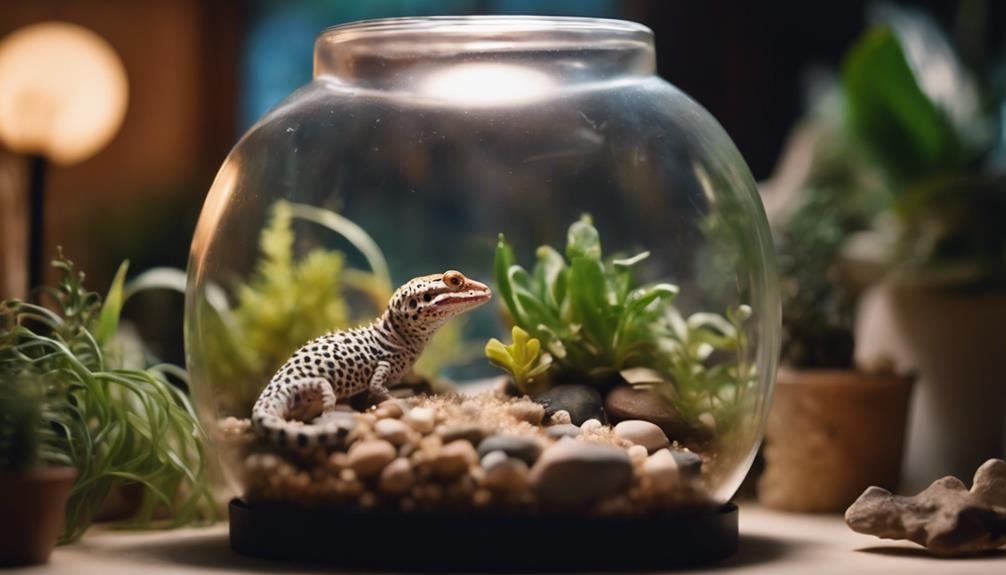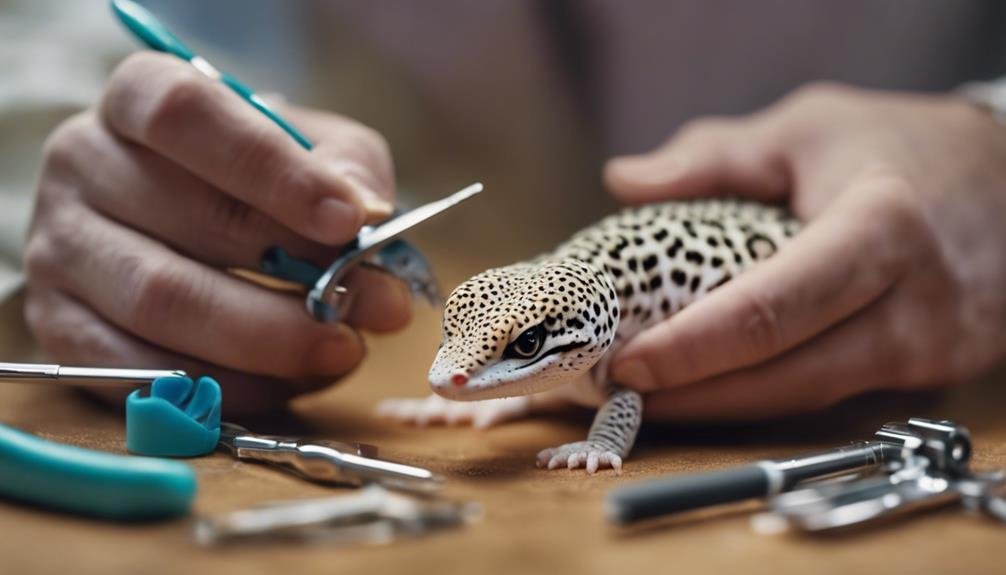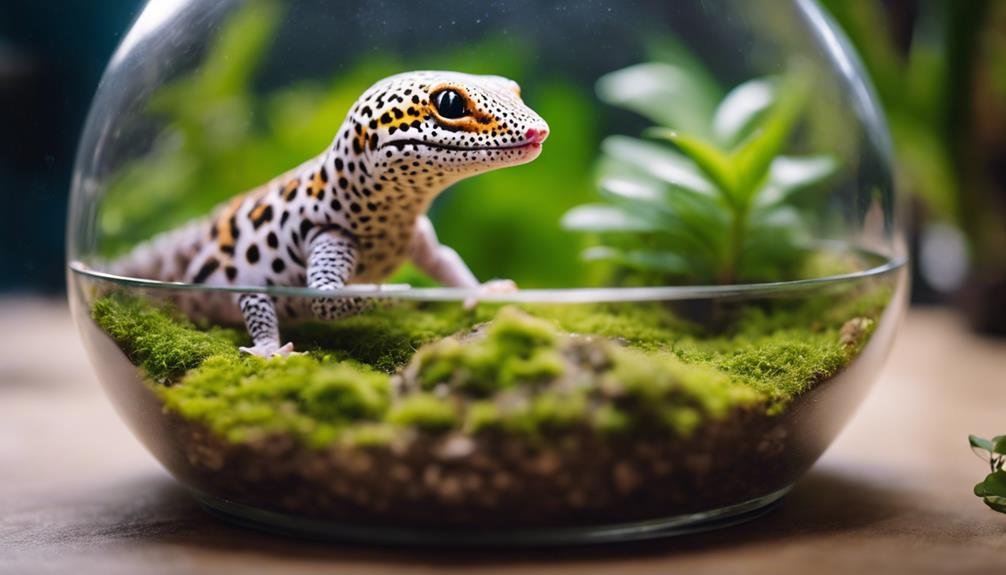You’ve likely heard that leopard geckos can live a surprisingly long life in captivity, sometimes reaching up to 20 years with proper care. However, achieving this lifespan isn’t just about providing food and shelter; it’s about creating an environment that mimics their natural habitat as closely as possible. From the right balance of diet and nutrition, including essential supplements, to the maintenance of ideal habitat conditions and the importance of regular veterinary care, there’s much to ponder in guaranteeing the healthiness and happiness of these fascinating creatures. But what exactly does ‘proper care’ entail, and how can you guarantee your leopard gecko not only survives but thrives under your care? Let’s explore the critical factors that contribute to their longevity and overall well-being.
Key Takeaways
- Leopard geckos can live up to 20 years in captivity with proper care.
- Ensuring a diet rich in live insects and necessary supplements supports longevity.
- Mimicking their natural habitat with appropriate temperature, humidity, and UVB lighting is essential.
- Regular veterinary check-ups and prompt treatment of health issues are crucial.
- Stress reduction through a well-structured habitat and bonding during feeding enhances health and happiness.
Captivity Lifespan Overview
Leopard geckos can thrive up to 20 years in captivity with the right care and conditions. This impressive lifespan is notably longer than many other pets, making the leopard gecko an enduring companion. The key to guaranteeing your gecko enjoys a long, healthy life lies in understanding and meeting its needs, from the habitat you provide to the medical attention it may require.
Factors such as habitat conditions play an essential role in the longevity of these creatures. A well-maintained environment that mimics their natural habitat reduces stress and illness, contributing to their health and well-being. Additionally, access to veterinary care when needed ensures any health issues are promptly addressed.
It’s worth noting that the average leopard gecko may have a slightly shorter lifespan in cases where female geckos undergo the stress of egg production. However, with careful attention to their living conditions and health, leopard geckos live remarkably long lives compared to their wild counterparts, who face predators, diseases, and environmental challenges. By providing a controlled environment, you’re offering your gecko a safe haven where it can thrive for years to come.
Diet and Nutrition
To guarantee your leopard gecko thrives, focusing on ideal food choices is key.
You’ll need to understand the significance of nutritional supplements, as these are crucial for their health and longevity.
Optimal Food Choices
Ensuring your leopard gecko maintains a balanced diet is essential. Provide a variety of live insects, including crickets, mealworms, and Dubia roaches, all gut-loaded and dusted with vital supplements. This varied diet, enriched with calcium and vitamin supplements, is crucial for their health and longevity.
- Joy: Watching your gecko eagerly hunt and consume their nutritious meals brings a unique satisfaction.
- Peace of Mind: Knowing they’re receiving all necessary nutrients for a thriving life.
- Pride: Observing the vibrant health and energy of your gecko as a result of your care.
- Connection: Feeding time becomes a special moment to bond, enhancing your relationship.
Always make sure fresh water is available, and remember, the size of the insects shouldn’t exceed the space between your gecko’s eyes to avoid any potential harm.
Nutritional Supplements Importance
While a varied diet is the foundation of your leopard gecko’s health, incorporating the right nutritional supplements can greatly enhance their well-being. Calcium supplements are essential to dodge metabolic bone disease. Alongside, Vitamin D3 supplements are important for calcium absorption, ensuring strong bones. Gut-loading insects with nutritious supplements before feeding them to your gecko boosts the quality of their diet.
Proper supplementation guarantees your gecko gets essential nutrients missing from an insect-based diet. Balancing calcium and vitamin intake is crucial for their health and longevity. Here’s a quick guide:
| Supplement | Purpose | Note |
|---|---|---|
| Calcium | Prevents bone disease | Must-have |
| Vitamin D3 | Aids calcium absorption | Essential for health |
| Gut-loaded | Enhances diet quality | Highly recommended |
Ensure you’re providing these supplements to maintain your gecko’s healthiness and happiness.
Habitat and Environment


Creating the right habitat and environment is essential for the well-being and longevity of your leopard gecko. Ensuring they live in a space that closely mimics their natural habitat can greatly impact their health and happiness. The use of UVB lighting, in particular, plays an important role in their ability to absorb calcium and maintain healthy bones, which is a cornerstone in preventing common health issues that could shorten their lifespan.
To evoke a deeper connection and understanding, consider these aspects of their care:
- Temperature Gradient: An essential aspect of their environment is maintaining a temperature gradient of 85-90°F during the day and dropping to 75-80°F at night. This gradient mimics their natural habitat and supports proper thermoregulation.
- Substrate Choice: Options like reptile sand, coconut fiber, or paper towels not only keep their enclosure clean but also prevent potential health risks.
- Humidity Levels: Keeping humidity levels within the 30-40% range is important for preventing shedding issues and maintaining skin health.
- Security and Enrichment: Providing hides and climbing structures allows your gecko to exhibit natural behaviors, making them feel secure and stimulated.
Common Health Issues
Understanding the appropriate habitat and environment sets the stage for a healthy leopard gecko, yet even with ideal care, they may still encounter common health issues. Metabolic Bone Disease is a serious condition that can lead to weakened bones, seizures, and tremors. Without proper calcium and vitamin D3, your gecko’s health could deteriorate rapidly, potentially leading to fatal outcomes. To prevent this, guarantee their diet is well-supplemented and their habitat has adequate UVB lighting.
Respiratory diseases are another concern, often triggered by excess humidity or mold in their enclosure. If you notice your gecko struggling to breathe, it’s essential to assess and adjust the humidity levels to prevent these bacterial lung infections. Similarly, retained shed, a consequence of low humidity, can cause circulation problems in extremities if neglected. Maintaining a balanced humidity level helps avoid this issue, ensuring your gecko can shed its skin completely.
These health issues highlight the importance of monitoring your leopard gecko’s living conditions closely. A well-maintained habitat, along with a balanced diet, can greatly reduce the risk of these common health problems, supporting a long and happy life for your pet.
Veterinary Care Importance


Why should you consider regular veterinary visits a cornerstone of caring for your leopard gecko? It’s simple. Veterinary care is essential for monitoring their health, ensuring they’re thriving under your care, and addressing any health issues that could shorten their lifespan.
- Preventative care is a game-changer, helping dodge common health pitfalls like metabolic bone disease or respiratory infections. By catching these issues early, you boost your gecko’s chances for a long, joyous life.
- Professional guidance on diet and habitat ensures you’re providing an environment that mimics their natural habitat, fostering both physical health and mental well-being.
- Early detection of potential health problems means quicker, more effective treatment, greatly improving the prognosis for your beloved pet.
- Addressing specific health concerns promptly with professional help can be the difference between a minor hiccup in their health journey and a life-threatening crisis.
Embracing veterinary care as a pillar of your leopard gecko’s care regimen not only addresses health issues promptly but also plays a crucial role in ensuring their longevity and happiness. Don’t underestimate the power of professional guidance to enrich the life of your scaly friend.
Maximizing Longevity
To guarantee your leopard gecko lives a long and healthy life, focusing on their diet and habitat is essential.
You’ll need to provide a balanced diet complemented with essential vitamins and make sure their living space has the right temperature and features like hiding spots and UVB lighting.
Proper Diet Essentials
Maximizing your leopard gecko’s diet with a variety of gut-loaded insects dusted with calcium and vitamin supplements is crucial for optimizing their longevity. A proper diet rich in nutrients not only contributes to their health but also extends their life span, potentially up to 20 years in captivity. Here’s what you need to remember:
- Provide crickets, mealworms, and Dubia roaches to offer a varied diet.
- Dust insects with calcium and vitamin supplements to meet nutritional needs.
- Avoid feeding insects larger than the space between their eyes to prevent health issues.
- Make sure fresh water is always available to keep them hydrated.
Ideal Habitat Setup
Creating an ideal habitat for your leopard gecko greatly enhances their chances of a long and healthy life. Proper care in setting up their environment is key to maximizing the longevity of your leopard. Make sure you’re providing a temperature gradient of 85-90°F during the day and 75-80°F at night. UVB lighting is essential for calcium absorption, and maintaining the right humidity levels prevents shedding issues and promotes well-being.
| Feature | Importance | Recommendation |
|---|---|---|
| Temperature | Critical | 85-90°F day/75-80°F night |
| UVB Lighting | Necessary | For calcium absorption |
| Humidity Levels | Essential | Prevent respiratory issues |
Using easy-to-clean substrates, along with hides and climbing structures, creates a comfortable and enriching habitat. Remember, regular cleaning and consultation with a reptile veterinarian are necessary for the health and happiness of your leopard gecko.
How Does the Natural Habitat of Leopard Geckos Impact Their Lifespan and Health in Captivity?
The natural habitat of leopard geckos plays a crucial role in their lifespan and health in captivity. These geckos thrive in dry and rocky areas, so mimicking their natural habitat with the right temperature, substrate, and hiding spots is essential for their well-being and longevity in captivity.
Frequently Asked Questions
How Long Do Healthy Leopard Geckos Live?
You’re curious about how long healthy leopard geckos live, right?
Well, with proper care, they can reach up to 20 years! It’s all about meeting their dietary needs, keeping their habitat at the right temperature, and understanding how breeding impacts their lifespan.
Regular vet visits, a balanced diet, and a stress-free environment are key.
Do Leopard Geckos Smile When They’re Happy?
No, leopard geckos don’t smile when they’re happy due to their gecko anatomy. They lack the facial muscles needed for such expressions, making it impossible for them to show emotions like humans.
Instead, you’ll notice their happiness through their behavior and activity levels. Look for signs like active exploration and clear, alert eyes.
Their contentment isn’t shown through reptile emotions on their faces but through their overall well-being and liveliness.
How Do I Know if My Gecko Is Unhappy?
To know if your gecko is unhappy, watch for unusual behaviors like excessive hiding or aggression. Appetite changes, such as eating less, often indicate something’s wrong.
Signs of habitat dissatisfaction include tail wagging, glass surfing, or constant pacing. Also, listen for unusual vocalizations.
Monitoring their activity levels and how they interact with their environment can give you clues about their well-being and happiness. These signs can help you address any issues quickly.
What Makes Leopard Geckos Happy?
To make your leopard gecko happy, focus on environmental enrichment, like providing various hiding spots and climbing areas.
A diet variety, including gut-loaded insects supplemented with calcium and vitamins, is key to their happiness.
Though they’re not highly social with other geckos, limited and gentle handling can promote a bond and reduce stress.
Keep their habitat clean, with proper temperature and humidity, to guarantee their well-being and happiness.
Conclusion
To sum up, you have the power to guarantee your leopard gecko not only survives but thrives in captivity. By providing a balanced diet, proper habitat, and regular vet care, you’re setting the stage for a happy and healthy life that can span up to 20 years.
Don’t underestimate the importance of early health issue detection and the right environmental conditions. With your dedication and love, your leopard gecko can enjoy a long, fulfilling life by your side.


